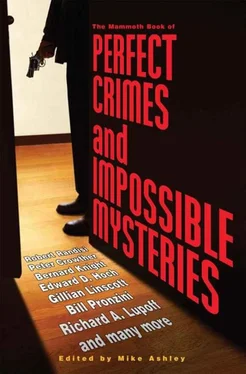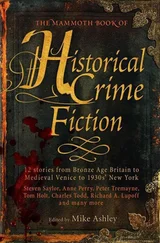The manager lit the gas-jet, and by its dim light a startling sight was presented. Lying near the fireplace, in a half-crouching position, face downwards, was Dick Usborne. Quickly I turned him over and touched his face. The contact thrilled me. He was stone dead!
His eyes, still open, were glazed and stared horribly, his strong hands were clenched, his jaw had dropped, and it was plain, by the coutortion of the body, that he had expired in agony.
Quickly suspicious of foul play, I made a rapid examination of the body. But I could find no wound or anything to account for death. A doctor, hastily summoned, was equally without any clue to the cause of death.
“Suicide, I should think!” he exclaimed when he had finished his examination. “By poison, most probably; but there is no trace of it about the mouth.”
Then, turning to the police-inspector who had just entered, he added:
“The door was locked on the inside. It must, therefore, have been suicide.”
“The gentleman was a friend of yours, I believe, sir?” asked the inspector, addressing me.
I replied in the affirmative, but declared that he was certainly not the man to commit suicide.
“There’s been foul play-of that I’m positive!” I declared emphatically.
“But he locked himself in,” the hotel manager argued. “He must have re-entered unobserved.”
“He was waiting here for me. He wished to speak to me,” I replied.
The theory held by all present, however, was that it was suicide; therefore the inspector expressed his intention of having the body conveyed to the Pimlico mortuary to await the usual post-mortem.
I then took him aside downstairs, and telling him in confidence who I was, and what office my dead friend held, I said:
“I must ask you, inspector, to lock up the room and leave everything undisturbed until I have made a few inquiries myself. The public must be allowed to believe it a case of suicide; but before we take any action I must consult my Chief. You, on your part, will please inform Superintendent Hutchinson, of the C.I. Department at Scotland Yard, that I am making investigations. That will be sufficient. He will understand.”
“Very well, sir,” replied the inspector; and a few moments later I left the house in a taxi. Each member of the Secret Service is a detective by instinct, and I suppose I was no exception.
Half an hour later I was seated with General Kennedy in his cosy little library in Curzon Street explaining briefly my startling discovery.
“That’s most remarkable!” he cried, greatly upset at hearing of our poor colleagues’s death. “Captain Usborne brought the man Günther here just after nine, and we had breakfast together. Then he left, promising to return at three to again take charge of the stranger. He arrived about a quarter past three, and both he and the German left in a four-wheeler. That is the last I saw of either of them.”
“Günther was to leave to-night. Has he gone?” I asked.
“Who knows?” exclaimed the shrewd, grey-headed little man, who, besides being a distinguished General, was Director of the British Secret Service.
“We must find him,” I said. Then after a moment’s reflection I added: “I must go to Liverpool Street Station at once.”
“I cannot see what you can discover,” replied the General. “If Günther has left he would not be noticed in a crowded train. If he left London he’s already on the North Sea by this time,” he added, glancing up at the clock.
“Usborne has been assassinated, sir,” I declared with emphasis. “He was my best friend. We have often been in tight corners on the Continent together. May I be permitted to pursue the investigation myself?”
“By all means, if you really believe it was not a case of suicide.”
“It was not-of that I’m quite certain.”
I was suspicious of Günther. The German might have been an impostor after all. Yet at Webster’s Dick had not been seen with any companion. He had simply gone there alone in order to wait for me.
For what reason? Ay, that was the question.
With all haste I drove down to Liverpool Street. On my way I took from my pocket a slip of paper – the receipt from a tourist-agency for the first-class return ticket between London and Berlin which I had sent to Günther. It bore the number of the German’s ticket. At the inspector’s office I was shown all the tickets collected of departing passengers by the boat-train, and among them found the German’s voucher for the journey from Liverpool Street to Parkeston Quay.
I had at least cleared up one point. Herr Günther had left London.
On returning to the dark little hotel just after midnight I found a man I knew awaiting me-Detective-Inspector Barker, who had been sent to me by Superintendent Hutchinson, the uniformed police having now been withdrawn from the house.
Alone, in the small sitting-room, we took counsel. Barker I knew to be a very clever investigator of crime, his speciality being the tracing and arrest of alien criminals who seek asylum in London, and for whose extradition their own countries apply.
“I’ve seen the body of the unfortunate gentleman,” he said. “But I can detect no suspicious circumstances. Indeed, for aught I can see, he might have locked himself in and died of natural causes. Have you any theory-of enemies, for example?”
“Enemies!” I cried. “Why, Dick Usborne was the most daring agent in our service. It was he who discovered and exposed that clever German agent Schultz, who tried to secure the plan of the new Dreadnought. Only six months ago he cleared out a nest of foreign spies down at Beccles, and it was he who scented and discovered the secret store of rifles and ammunition near Burnham-on-Crouch in Essex. But probably you know nothing of that. We’ve kept its discovery carefully to ourselves for fear of creating a panic. Dick, however, had a narrow escape. The night he broke into the cellars of the country inn where the depot had been established he was discovered by the landlord, a Belgian. The latter attempted to secure him, but Dick succeeded in snatching up the Belgian’s revolver, firing a shot which broke the blackguard’s arm, and so escaped. Such a man is bound to have enemies – and vengeful ones too,” I added.
The mystery was full of puzzling features. The facts known were these. At noon Dick had arrived at that place and, under the name of Mr Clarke, had taken a room. Just after three o’clock he had been at Curzon Street, but after that hour nothing more had been seen of him until we had found him dead.
The chief points were, first, the reason he had so suddenly gone into hiding; and, secondly, why he feared to come round to my rooms, although he desired to consult me.
Sending Barker across to despatch a telegram, I ascended alone to the dead man’s room, and, turning up the gas, made a minute investigation. Some torn paper was in the fireplace – a telegraph form. This I pieced together, and, in surprise, found it to be a draft in pencil of the telegram I had received – but it was not in Dick’s handwriting.
I searched my dead friend’s pockets, but there was nothing in them of any use as clue. Men of my profession are usually very careful never to carry anything which may reveal their identity. Travelling so much abroad as we do, we never know when we may find ourselves in an awkward situation, and compelled to give a fictitious account of ourselves to a foreign ponce bureau.
That small, rather comfortless room was of the usual type to be found in any third-rate private hotel in London – the iron bedstead, the threadbare carpet, the wooden washstand, and lace curtains limp and yellow with smoke.
While Barker was absent I carefully examined everything, even the body of Dick himself. But I confess that I could form no theory whatever as to how he had been done to death, or by what means the assassin had entered or left the room.
Читать дальше











